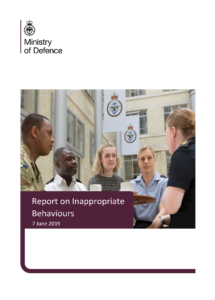On Monday 15th July, the Ministry of Defence published their Report on Inappropriate Behaviours. The report, written by Air Marshal Wigston which makes 36 recommendations, is an important step in improving the culture in defence and one that I wholeheartedly welcome.

On Monday 15th July, the Ministry of Defence published their Report on Inappropriate Behaviours. The report, written by Air Marshal Wigston which makes 36 recommendations, is an important step in improving the culture in defence and one that I wholeheartedly welcome.
As the Service Complaints Ombudsman for the Armed Forces, it is my role to help build a better Service complaints system for all Service personnel. While I do this through general oversight of the system and the handling of individual casework, each of the single Services and the Ministry of Defence has a role to play too. After all, they own the complaints system. This is why reports such as this most recent one are so significant.
The term inappropriate behaviours is quite broad. It includes behaviours that are often the subject of formal Service complaints, including bullying and harassment, and also behaviours that are criminal, including sexual offences, which fall outside of the system I have oversight of.
Given this overlap, the report makes reference to a number of observations and recommendations I have made in previous Annual Reports. While I am not pleased that these issues still exist in the system despite my recommendations, I am heartened to see that Marshal Wigston has echoed some of the concerns I have raised over the years, particularly concerning the need to build trust and confidence in the complaints system
Since the report was published, the two questions I have been asked most often are:
- Does the report go far enough?
This report was conducted following a direction from the Secretary of State for Defence and there was a tight timeline for delivery. In spite of these constraints, it is my opinion that the final report does an exemplary job at:
- Highlighting the issues
- Identifying the gaps in data and knowledge
- Providing a solid blueprint for action
With 36 recommendations, the publication of the report is only the first step. The real challenges will come in the implementation of those recommendations and the continuing drive to improve culture across the Armed Forces.
- What does it mean for the Service complaints system and how will it impact on my role as Ombudsman?
Many of the recommendations made in the report, which include training and improved support and resource, will have a tangible impact on the Service complaints system. The recommendation that will have the biggest impact is the establishment of a Defence Authority.
The Authority, which will provide increased governance, will also have a dedicated Service complaints team that will deal will deal with complaints of inappropriate behaviour that exceed a certain threshold.
Further recommendations have been made to consider the introduction of a two-tier complaints system, which I agree warrant further consideration.
In terms of how these changes will impact my role, put simply – they won’t. I will continue to retain oversight of the wider Service complaints system and this would include Service complaints aspects of the Defence Authority.
I look forward to giving further consideration to the report over the coming weeks and months and seeing how the recommendations are implemented. The goal of improving the Service complaints system is, as I said above, a shared goal and this report provides a further stepping stone to achieving that goal.